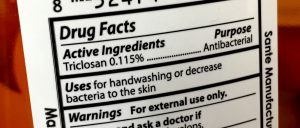TRICLOSAN
May 14, 2018
 One of my great patients, Malcolm, recently sent me an article he received from his Alma Mater entitled “Risky Bristles”. Malcom wanted me to share some information with you about triclosan.
One of my great patients, Malcolm, recently sent me an article he received from his Alma Mater entitled “Risky Bristles”. Malcom wanted me to share some information with you about triclosan.
According to the Environmental Protection Agency, triclosan is an antimicrobial agent that helps to “slow or stop the growth of bacteria, fungi, and mildew.” It first started to appear in antibacterial hand soap products in the 1970’s.
Since then, according to the Center for Disease Control, “it has been used in consumer products such as detergents, soaps, skin cleansers, deodorants, lotions, creams, toothpastes, and dishwashing liquids.” Many products labeled as “antibacterial” may contain triclosan or related compounds.
One of those products that contains triclosan is Colgate Total toothpaste. The reason the triclosan is in the toothpaste is to fight gingivitis, a common disease that causes inflammation and bleeding gums. Last year, an independent review of triclosan in toothpaste concluded that the chemical “reduced plaque, gingival inflammation, and gingival bleeding” but that those reductions “may or may not be clinically important.”
So, what’s the problem? While long-term research is lacking in humans, several studies of the effects of triclosan in mice and rats have found adverse health effects at high concentrations. Included in these findings were reduced fertility and increased cancer risk. It is important to note that chemicals can affect animals differently from humans. Animal testing can involve much higher concentrations of tested chemicals than humans would ever be exposed to. However, these kinds of findings in animals definitely raise eyebrows as to whether chemicals like triclosan are safe for human use.
According to the Center for Disease Control, “the human health effects from exposure to low environmental levels of triclosan are unknown. More research is needed to assess the human effects of exposure to triclosan.”
In December 2017, the FDA issued a final rule regarding certain OTC health-care antiseptic products. As a result, companies will not be able to use triclosan or 23 other active ingredients in these products without premarket review due to insufficient data regarding their safety and effectiveness. However, in 1997, the FDA reviewed extensive effectiveness data on triclosan in Colgate Total toothpaste. The evidence showed that triclosan in that product was effective in preventing gingivitis, so I believe this is still present in this toothpaste.
Triclosan has been phased-out of many soap products because of mounting evidence that these products don’t provide any health benefits above regular soap and water.
Certain environmental groups raised concerns over a decade ago that triclosan in soaps might be contributing to the rise in antibiotic resistant bacteria, which can cause dangerous infections that are hard to treat. These groups are also concerned that because the chemical gets washed down the drain, it may disrupt algae and wildlife found in water ecosystems.
So, should you throw away your toothpaste if it contains triclosan? That is up to you. My opinion is that there are plenty of other products and methods, without the inclusion of triclosan, that reduce the risk of gingivitis. Proper home care with any toothpaste in addition to regular dental visits, are sufficient to control gingivitis in most people.
Dr. St. Clair maintains a private dental practice in Rowley and Newburyport dedicated to health-centered family dentistry. If there are certain topics you would like to see written about or questions you have please email them to him at jpstclair@stclairdmd.com. You can view all previously written columns at www.jpeterstclairdentistry.com/blog.
No Comments
No comments yet.
RSS feed for comments on this post.
Sorry, the comment form is closed at this time.







